Please help the National Weather Service spread these important safety messages on social media! Everyone is welcome to use the text and images provided below to help the NWS build a Weather-Ready Nation.
Facebook
Wildfire smoke is a mix of gases and fine particles from burning vegetation and other materials. It can travel hundreds of miles and cause health concerns. Stay Weather-Ready by learning how to protect yourself. cdc.gov/disasters/wildfires/index.html
Twitter
Wildfire smoke is a mix of gases and fine particles from burning vegetation and other materials. It can travel hundreds of miles and cause health concerns. Stay Weather-Ready by learning how to protect yourself. cdc.gov/disasters/wildfires/index.html

Facebook
Wildfires are caused by a spark (usually man-made) in the presence of fuel (dry vegetation) and oxygen. Strong winds, high temperatures, low humidity and drought conditions can further impact the fire’s spread. To stay Weather-Ready and protect yourself from wildfires, visit weather.gov/safety/wildfire
Twitter
Wildfires are caused by a spark in the presence of fuel and oxygen. Strong winds, high temperatures, low humidity and drought conditions can further impact the fire’s spread. To stay #WeatherReady and protect yourself from wildfires, visit weather.gov/safety/wildfire
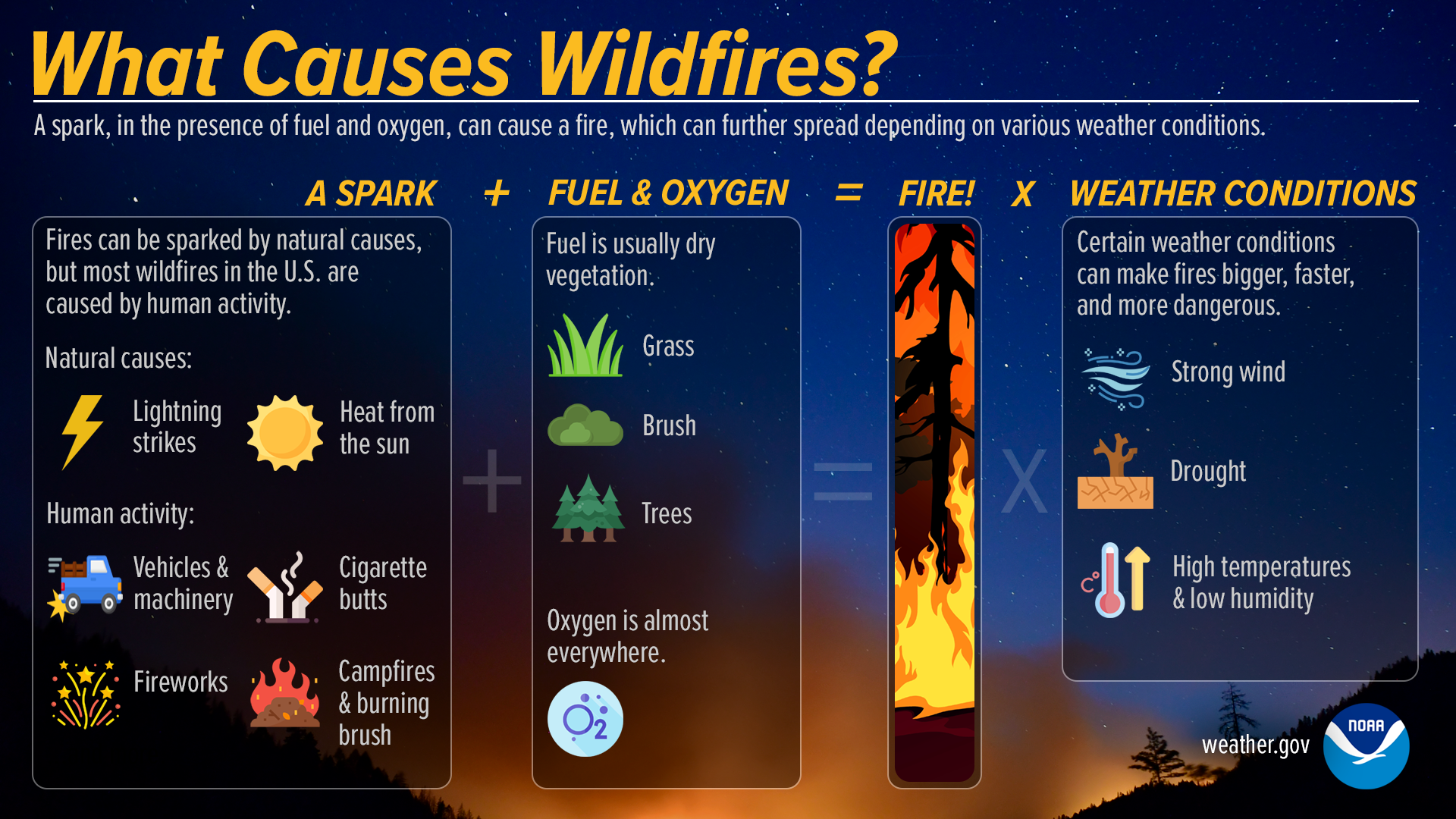
Facebook
Many everyday things can spark wildfires. Keep ignition sources far away from dry vegetation, wood and other fuel. Be aware of weather conditions. Always follow burn bans & local, state, and federal regulations. weather.gov/safety/wildfire-ww
Twitter
Many everyday things can spark wildfires. Keep ignition sources far away from dry vegetation, wood and other fuel. Be aware of weather conditions. Always follow burn bans & local, state, and federal regulations. weather.gov/safety/wildfire-ww #WeatherReady

Facebook
A Fire Weather Watch means BE PREPARED, critical fire weather conditions are expected or possible, but not imminent or occurring. A Red Flag Warning means TAKE ACTION, critical fire weather conditions are either occurring now or will shortly. Learn more at weather.gov/safety/wildfire-ww
Twitter
Know the difference between a Red Flag Warning and Fire Weather Watch. weather.gov/safety/wildfire-ww #WeatherReady

Facebook
Wildfires can spread quickly — by the time one is nearby, you may not have much time. Stay Weather-Ready by preparing ahead of time. Ready your home, have an evacuation plan, and prepare an emergency supply kit. weather.gov/safety/wildfire
Twitter
Wildfires can spread quickly — by the time one is nearby, you may not have much time. Stay #WeatherReady by preparing ahead of time. Ready your home, have an evacuation plan, and prepare an emergency supply kit. weather.gov/safety/wildfire

Facebook
If wildfires are threatening your area, stay informed of evacuation orders. Leave immediately when asked to avoid being caught in fire, smoke, or road congestion. Have an emergency supply kit in your vehicle and know your evacuation route.
weather.gov/safety/wildfire
Twitter
If wildfires are threatening your area, stay informed of evacuation orders. Leave immediately when asked to avoid being caught in fire, smoke, or road congestion. Have an emergency supply kit in your vehicle and know your evacuation route.
weather.gov/safety/wildfire

Facebook
There are aspects of wildfire preparation, like using fire-resistant landscaping around your home, that may not be possible for everyone. However, there are also small, potentially life-saving decisions that anyone can make. Small decisions like not burning brush during dry conditions, and clearing brush away from your home can make a big impact in not only your life...but in the lives of those around you. weather.gov/safety/wildfire
Twitter
There are aspects of wildfire preparation, like using fire-resistant landscaping around your home, that aren’t possible for everyone. However, there are also small, potentially life-saving decisions that anyone can make. weather.gov/safety/wildfire #WeatherReady

Facebook
Planning on burning brush? Know your limits. Even if there’s no Red Flag Warning, burning when windy or during low humidity can still be dangerous! weather.gov/safety/wildfire
Twitter
Planning on burning brush? Know your limits. Even if there’s no Red Flag Warning, burning when windy or during low humidity can still be dangerous! weather.gov/safety/wildfire #WeatherReady

Facebook
What does being Weather-Ready look like? When it comes to wildfires, it means working to create defensible space by clearing brush around your property. Learn more about defensible space and other wildfire preparedness tips at weather.gov/safety/wildfire
Twitter
What does being #WeatherReady look like? When it comes to wildfires, it means working to create defensible space by clearing brush around your property. Learn more about defensible space and other wildfire preparedness tips at weather.gov/safety/wildfire

Facebook
What causes wildfires to spread? The main culprits are dry vegetation, strong winds, high temperatures, and drought conditions.To stay Weather-Ready and protect yourself from wildfires, visit weather.gov/wildfire
Twitter
What causes wildfires to spread? The main culprits are dry vegetation, strong winds, high temperatures, and drought conditions. To stay #WeatherReady and protect yourself from wildfires, visit weather.gov/wildfire #WildfireScience
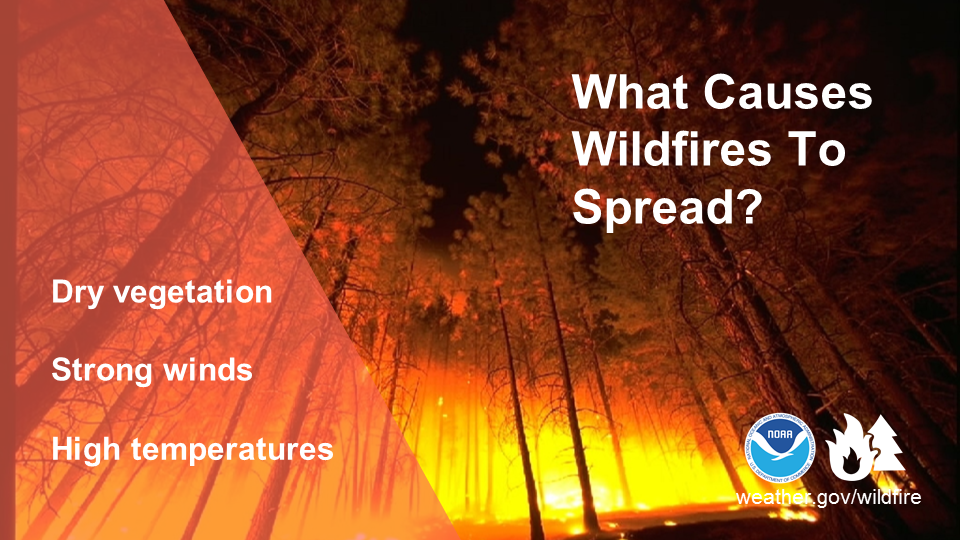
Facebook
Wildfires killed an estimated 90+ people in the U.S. in 2018. Do you know the basics of Wildfire Safety? Stay Weather-Ready by watching this short video: https://youtu.be/OGiRja2EZJ8
Twitter
Wildfires killed an estimated 90+ people in the U.S. in 2018. Do you know the basics of #WildfireSafety? Stay #WeatherReady by watching this short video: https://youtu.be/OGiRja2EZJ8
Facebook
In 2021, wildfires burned over 7 million acres, and destroyed nearly 6,000 structures, including over 3500 residences. Let’s do our part to keep this year’s totals well below those numbers. weather.gov/safety/wildfire-ready
Twitter
In 2021, wildfires burned over 7 million acres, and destroyed nearly 6,000 structures, including over 3500 residences. weather.gov/safety/wildfire-ready #WeatherReady

Facebook
There are a lot of factors that determine the speed of wildfires. Check out the infographic below to learn a little wildfire science, and visit weather.gov/safety/wildfire for the latest safety tips.
Twitter
There are a lot of factors that determine the speed of wildfires. Check out the infographic below to learn a little #WildfireScience, and visit weather.gov/safety/wildfire for the latest safety tips. #WeatherReady

Facebook
Wildfire smoke can be harmful in multiple ways. Smoke can hurt your eyes, irritate your lungs, and worsen respiratory illness. Learn how you can protect your health and be safe if you are exposed to wildfire smoke. cdc.gov/air/wildfire-smoke/default.htm
Twitter
Wildfire smoke can hurt your eyes, irritate your lungs, and worsen respiratory illness. Learn how you can protect your health and be safe. cdc.gov/air/wildfire-smoke/default.htm #WildfireSafety

Facebook
During a wildfire, protect yourself from smoke. Stay inside and close windows and doors. If you're running an air conditioner, keep the fresh air intake closed and clean the filter to prevent outdoor smoke from getting inside. Note that cloth face coverings worn to help protect against the spread of COVID-19 do not protect against breathing in wildfire smoke. cdc.gov/air/wildfire-smoke/default.htm
Twitter
Take steps to minimize the health impacts from wildfire smoke. Stay inside and close windows and doors. Don't rely on cloth face coverings or surgical masks to prevent breathing in wildfire smoke. cdc.gov/air/wildfire-smoke/default.htm #WildfireSafety

Facebook
Wildfire smoke is a mix of gases and fine particles from burning vegetation and other materials. It can travel hundreds of miles and cause health concerns. Learn how to drive safely if smoke is affecting visibility in your area: cdc.gov/disasters/wildfires/index.html
Twitter
Wildfire smoke can travel hundreds of miles and affect cities. Learn how to drive safely if smoke is affecting visibility in your area: cdc.gov/disasters/wildfires/index.html #WeatherReady
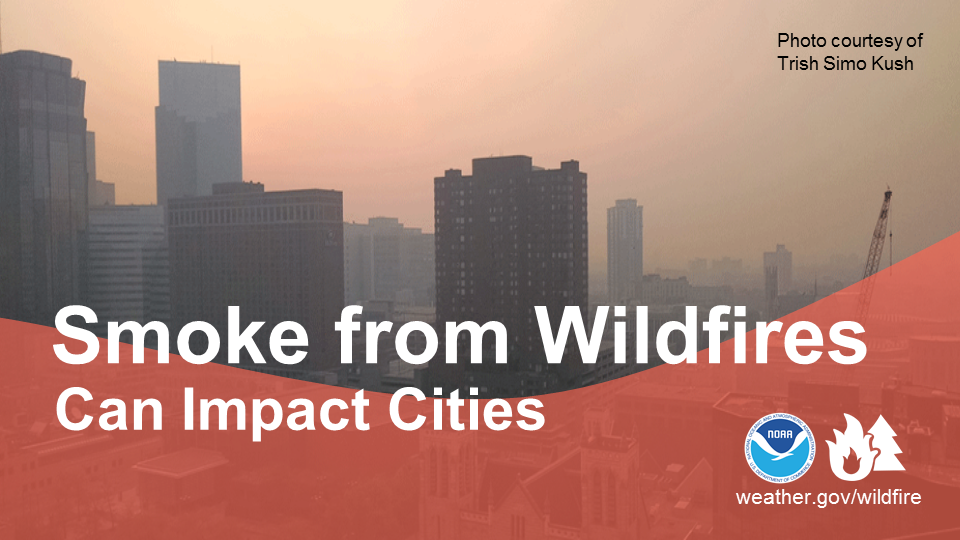
Facebook
NOAA's National Weather Service works with federal and state wildland managers to protect lives and property in and around America's wildlands. A visit to our Wildfire Safety site will help you prepare, be aware, and act early if a wildfire comes your way. weather.gov/wildfire
Twitter
NOAA's National Weather Service works with federal and state wildland managers to protect lives and property in and around America's wildlands. weather.gov/wildfire #WeatherReady
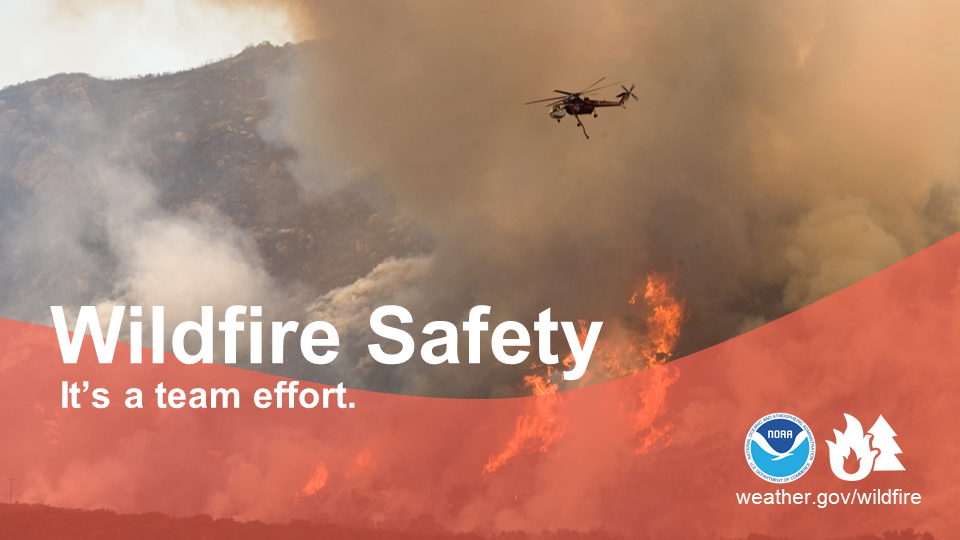
Facebook
If you fly, we can’t! Drones near wildfires are not safe. Only authorized aircraft are permitted near wildfires. Let wildland firefighters do their jobs to keep the public safe. https://www.youtube.com/watch?v=06pz4GW7mY0
Twitter
If you fly, we can’t! Drones near wildfires are not safe. Only authorized aircraft are permitted near wildfires. Let wildland firefighters do their jobs to keep the public safe. https://www.youtube.com/watch?v=06pz4GW7mY0 #WeatherReady
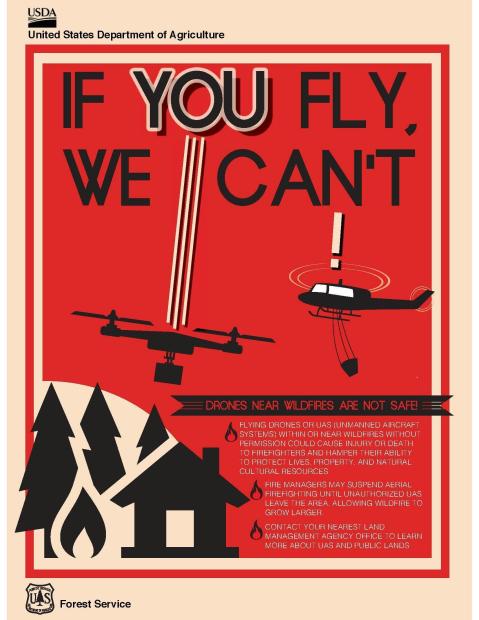
Facebook
Did you know that National Weather Service meteorologists work on-scene at large wildfires? These Incident Meteorologists (IMETs) go through extensive training and work in challenging conditions to support wildland firefighting and containment operations. Learn what it’s like for an IMET working a wildfire: weather.gov/news/imet-article
Twitter
Did you know that @NWS Meteorologists work on-scene at large wildfires? weather.gov/news/imet-article #WeatherReady

Facebook
Your family may not be together when a disaster strikes, so it is important to plan in advance: how will you get to a safe place; how you will contact one another; how and where you will meet; and what will you do in different situations. Create a Family Communications Plan. ready.gov/make-a-plan
Twitter
Your family may not be together when a disaster strikes. Make a plan ready.gov/make-a-plan #WeatherReady

Facebook
During wildfire season, visit AirNow to get the Air Quality Index in your area. Wildfire smoke can cause health problems during prolonged exposure, so it is best to know the air quality in your area in case you are planning an outdoor activity, such as camping. airnow.gov
Twitter
During wildfire season, stay healthy. Get the Air Quality Index in your area. airnow.gov #WeatherReady

Facebook
During wildfire season, visit airquality.weather.gov to get hour by hour predictions of wildfire smoke and other pollutants for your area.
Twitter
During wildfire season, visit airquality.weather.gov to get hour by hour predictions of wildfire smoke and other pollutants for your area. #WeatherReady
